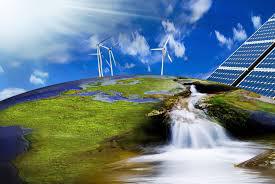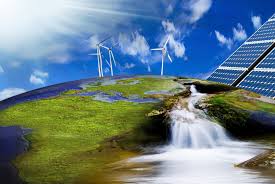
As per a news report, the demand for energy is set to rise by 35% by 2035 throughout the world. With the increase in the demand for energy, it is likely that there is going to be a corresponding increase in demand for water as well which is likely to be heavily used by the energy sector. Thus it is imperative that cost effective and renewable energy sources are used, so as to safeguard our energy, water and food production and supplies.
This report, prepared by the International Renewable Energy Agency, (IRENA) with the title of “Renewable Energy in the Water, Energy & Food Nexus” says that just the integration of energy with the agricultural food supply chain alone could help reduce volatility in costs, reduce the emission of green house gases, strengthen energy security and positively contribute to long term food sustainability.
The report was tabled at the International Water Summit which was held in Abu Dhabi between the 18th and the 21st of January 2015. It takes into account various methodologies of renewable energy which can be set-off against reduced energy intensive services. It compares energy requirements for resource-intensive energy services used by conventional energy technologies with green technologies.
It goes to show that “Globally, an energy system with substantial shares of renewables, in particular solar photovoltaics and wind power, would save significant amounts of water, thereby reducing strains on limited water resources.”
However, more thorough and detailed research is to be done to figure out the roles, properties, cause and effect that this intermingling and interconnected roles that energy, water and food play amongst each other. What is becoming increasingly clear is that renewable energy is likely to play a major role in providing clean clear drinking water for the masses through desalination techniques.
IRENA’s Deputy Director of Knowledge, Policy and Finance, Dr. Rabia Ferroukhi, said that “water, energy and food systems are inextricably linked: water and energy are needed to produce food; water is needed for most power generation; and energy is required to treat and transport water in what is known as ‘the water-energy-food nexus’.”
She went on to add that already there are positive signs that renewable energy is providing fresh water in the Middle East and Africa. Globally, more than 50% of desalination happens in these two regions.
Although renewable energy is yet to be widely adopted, technological advancements will make it more cost effective and will deepen its adoption by the populace in the long run. For nations that can afford the cost, it is well worth it. Abu Dhabi’s Shams 1 already generates more than 100MW of electricity which is fed into the United Arab Emirates national grid.
Conveniently located in the middle of the desert, Shams 1 covers an area that equates to 285 football fields and incorporates the latest in parabolic trough technology that makes use of 768 tracking parabolic trough collectors couples with 258,000 mirrors.
Sham 1’s plant manager, Mr. Abdulaziz Albaidli, said that the plant displaces almost 175,000 tonnes of UAE’s carbon dioxide per year. What is also of orime importance is the fact that Shams 1 significantly reduces UAE’s water requirements which is major advantage in the arid conditions of the dry desert.
References:
http://www.ipsnews.net/2015/01/renewables-can-benefit-water-energy-and-food-nexus/
This report, prepared by the International Renewable Energy Agency, (IRENA) with the title of “Renewable Energy in the Water, Energy & Food Nexus” says that just the integration of energy with the agricultural food supply chain alone could help reduce volatility in costs, reduce the emission of green house gases, strengthen energy security and positively contribute to long term food sustainability.
The report was tabled at the International Water Summit which was held in Abu Dhabi between the 18th and the 21st of January 2015. It takes into account various methodologies of renewable energy which can be set-off against reduced energy intensive services. It compares energy requirements for resource-intensive energy services used by conventional energy technologies with green technologies.
It goes to show that “Globally, an energy system with substantial shares of renewables, in particular solar photovoltaics and wind power, would save significant amounts of water, thereby reducing strains on limited water resources.”
However, more thorough and detailed research is to be done to figure out the roles, properties, cause and effect that this intermingling and interconnected roles that energy, water and food play amongst each other. What is becoming increasingly clear is that renewable energy is likely to play a major role in providing clean clear drinking water for the masses through desalination techniques.
IRENA’s Deputy Director of Knowledge, Policy and Finance, Dr. Rabia Ferroukhi, said that “water, energy and food systems are inextricably linked: water and energy are needed to produce food; water is needed for most power generation; and energy is required to treat and transport water in what is known as ‘the water-energy-food nexus’.”
She went on to add that already there are positive signs that renewable energy is providing fresh water in the Middle East and Africa. Globally, more than 50% of desalination happens in these two regions.
Although renewable energy is yet to be widely adopted, technological advancements will make it more cost effective and will deepen its adoption by the populace in the long run. For nations that can afford the cost, it is well worth it. Abu Dhabi’s Shams 1 already generates more than 100MW of electricity which is fed into the United Arab Emirates national grid.
Conveniently located in the middle of the desert, Shams 1 covers an area that equates to 285 football fields and incorporates the latest in parabolic trough technology that makes use of 768 tracking parabolic trough collectors couples with 258,000 mirrors.
Sham 1’s plant manager, Mr. Abdulaziz Albaidli, said that the plant displaces almost 175,000 tonnes of UAE’s carbon dioxide per year. What is also of orime importance is the fact that Shams 1 significantly reduces UAE’s water requirements which is major advantage in the arid conditions of the dry desert.
References:
http://www.ipsnews.net/2015/01/renewables-can-benefit-water-energy-and-food-nexus/





